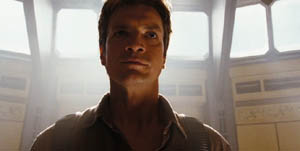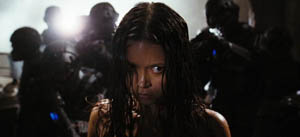|
So, what can I say about the film Serenity? Well, hang on; I'll toss some words against the wall and see if any of them stick.  A rare-possibly unique-scenario in filmdom, Serenity is a big (well, reasonably big) budget sequel to a television series that never even finished out its first season. Much as with films like The Terminator, the television series Firefly owed its success more to the home video industry than its original venue. The show's dedicated fans made this ressurection possible, which is good and all, though I've never liked and still don't like fandoms in general, as they tend to be comprised of obsessive dorks who seem to think that liking a particular show/movie/comic book/whatever somehow makes them special by proxy. I'm mightily glad that my own livelihood in no way requires me to be grateful to these cultish buffoons, all of whom seem to have some special name for their gang-in this case "Browncoats," a term which was maybe used twice in the whole show-just to indicate that they're all one big, happy, sniping, infighting-ridden dysfunctional family. It would be easy to dismiss nearly anything as hopelessly stupid, sight-unseen, simply from the behavior of the attendant fandoms, which possess an uncanny ability to make one embarrassed at liking damn near anything, but I'm here to tell you that making this sort of knee-jerk judgement in this instance would be a mistake. The television series Firefly was a good show, with well-defined and good characters and writing, and was short-lived due to the fact that Fox wouldn't know good programming if it walked up and bit them on the ass; they'd just tape it and air it as part of America's Funniest Ass-Bitings. So it came about that after the DVD boxed set of the unfinished first season became a best-seller in spite of Fox's best efforts to wreck the show by burying it in a crappy time slot and showing the episodes out of order, series creator Joss Whedon, known best for the Buffy the Vampire Slayer TV series, got the chance to give his story an ending after all. So how does it fare? My answer would be-and is-"quite well." The movie is good. It's a lot of fun. The action is exciting and has a visceral feel of near loss-of-control; one recalls the thrill of seeing the asteroid field sequence in The Empire Strikes Back for the first time when watching the climactic space battle, as two opposing fleets tumble and careen through one another in a surge of sheer exhilarating chaos. To continue the Star Wars comparison for just a moment longer (and only for a moment, as Serenity, space opera or no, is quite different in tone and story), it also has something which we all loved from the original trilogy that was sorely lacking in the prequels: humor. Clever, quotable one-liners that serve to ingratiate the characters to the audience and lighten the tension in the scarier parts. Most importantly, the humor all comes out of character dynamics, and not from simply cracking jokes at the camera in a contrived manner. The direction is executed quite skillfully, as well. Things happen in this movie that, shockingly enough for a sci-fi drama, we actually don't see coming, and the title sequence is played out in a single elaborate tracking shot that recalls the flamboyant one-shot scenes of Welles and Hitchcock at their most playful. Yes, I said it: this SF pulp drama is actually artful in its execution. Computer graphics are used to create the spacecraft and a few city vistas, but the film doesn't rely on them unduly; there are no CG aliens (or any aliens, for that matter), superfluous bullet-time shots or other trendy excesses thrown in as eye candy, and the resulting film has a much more tangible, hands-on feel than most modern sci-fi. 
While boasting a sizeable cast of characters, the main protagonists are Captain Malcolm Reynolds, master of a smuggling craft and former soldier on the losing side of a war, and River Tam, a young prodigy conditioned by government operatives to be a mind-reading killing machine. Mal has taken River and her brother Simon under his care following her escape from the government's secret facility, and has found the heat that this has brought down upon his head to test the limits of himself and his crew. Not the typical hero figure, Mal is often bitter and dark (in fact, far more so than in the TV series, where copious notes from Fox execs insisted he be made more light-hearted) as he struggles to keep his crew alive and searches for a cause worth fighting for after losing all he once cared about. Whedon isn't afraid to make his hero often downright unsympathetic, and has a good knack for penning interesting, multidimensional villains, as well. In short, this is a character drama, and not a two-hour diversion where the point seems to be watching faceless nobodies shoot monsters in a cave/derelict spaceship/sewer, which seems to be what 95% of science fiction flicks these days end up being. The film isn't a picture of perfection, even though it is very good. The TV series had a cast of nine main characters, which while a good thing for an ongoing series is a few too many for a two-hour feature. Inevitably, some of them feel as if they've been underutilized, and for first-time viewers it's probably a bit much to take in. I don't have the perspective of someone who comes in with no knowledge of the show, so it's hard to tell if the plot holds up given only the information communicated by the film alone. As a finale to the truncated TV drama, it works just fine, but as a stand-alone piece, it may be trying to do too much too rapidly. That said, the film moves along at a good clip, without ever feeling like it's dragging its heels or wasting any of its valuable time. The pace is so propulsive that we barely even get time to wonder how the Reavers, spacefaring cannibals with atrocious hygiene issues, can manage to stop jumping up and down and screaming long enough to master the fine art of spacecraft operations. By the time we get to that part of the story, such issues hardly seem important. One really need look no further than the trailers that played before the film to see just how much the SF genre needs more films of this ilk. When your movie is being promoted on the quip "If it moves, kill it," as the film version of the video game Doom (why God, WHY???) seems to be doing, it's nearly impossible to miss seeing just how much the writing is a virtual non-issue with most sci-fi action films, and it makes us appreciate films like Serenity all the more. If nothing else, those who liked the series can now feel some satisfaction at seeing the story begun in Firefly now brought to a conclusion of sorts, but while I'll content myself with this small victory if need be, I'm still crossing my fingers and hoping for more. -review by Matt Murray
|
|
||||||||